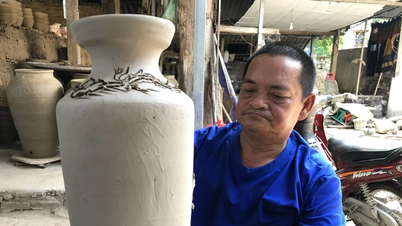The conference was held in both direct and online formats with the participation of representatives of the World Health Organization (WHO), departments, bureaus, units under and directly under the Ministry of Health , Departments of Health of provinces and cities, central and local hospitals.
 |
| View of the national conference to implement the National Action Plan on infection control in medical examination and treatment facilities for the period 2025 - 2030. Photo: HA AN |
Speaking at the conference, Prof. Dr. Tran Van Thuan, Deputy Minister of Health , Chairman of the National Medical Council, affirmed: "Infection control is not only a professional requirement, but also a vital task for patient safety, quality of medical examination and treatment and the ability to respond to public health challenges."
Deputy Minister Tran Van Thuan said that in recent years, the health sector has made many efforts to improve the infection control system, from building a legal framework, training specialized human resources, to synchronously implementing technical and professional processes. The initial results have created a foundation for sustainable development, towards international standards in infection control work. The Deputy Minister also frankly acknowledged: The health system is still facing many difficulties. These are the large gaps in capacity between levels; lack of facilities, equipment, chemicals, medical supplies; limited awareness of compliance with procedures among a number of health workers and patients; especially the increasingly serious risks from antibiotic resistance and multi-drug resistant bacteria.
In addition, the emergence of new and re-emerging epidemics urgent poses requirements for innovation in thinking, action and organizational models for infection control. “These challenges require strong, synchronous, continuous and sustainable actions from all levels, sectors, localities and each medical facility,” the Deputy Minister emphasized.
The National Action Plan on Infection Control for the 2025-2030 period is a strategic guidance document, aiming to synchronize infection control activities throughout the health sector, while being consistent with WHO recommendations and sustainable development goals for health. The plan identifies eight key contents that need to be implemented synchronously: Identifying infection control as a fundamental task, closely linked to quality management and patient safety. This is not the sole responsibility of the Infection Control Department but the daily work of all medical staff in each medical examination and treatment facility. Proactively develop specific action plans in each locality and unit, with clear assignment of responsibilities, and a mechanism for monitoring - evaluation - continuous improvement. Perfecting the organizational and human resource system, ensuring specialization and expertise, having appropriate training and remuneration policies, and integrating infection control into the regular and continuing medical training program. Increase investment in facilities, equipment, and medical supplies for infection control; apply information technology and digital transformation to improve the effectiveness of monitoring, warning, and data analysis. Strictly comply with national professional guidelines, synchronize technical processes and quality criteria. Pay special attention to controlling the use of antibiotics, preventing blood, respiratory, urinary, and surgical infections. Link infection control with national health programs such as antibiotic resistance prevention, hospital quality management, and epidemic response. Promote communication and raise public awareness, build a culture of hospital safety, and build trust between patients and the health system. Encourage scientific research, technology transfer, expand international cooperation, and make the most of support resources from organizations and development partners.
With a clear strategic direction, commitment from industry leaders, consensus from the medical team and support from international organizations, the National Action Plan on Infection Control for the period 2025-2030 is expected to contribute to building a safe - quality - reliable medical examination and treatment system, ready to effectively respond to future medical challenges.
Source: https://baophuyen.vn/xa-hoi/202504/bo-y-te-trien-khai-ke-hoach-hanh-dong-quoc-gia-ve-kiem-soat-nhiem-khuan-giai-doan-20252030-1816022/



![[Photo] Prime Minister Pham Minh Chinh receives leaders of several leading Brazilian corporations](https://vphoto.vietnam.vn/thumb/1200x675/vietnam/resource/IMAGE/2025/7/6/3622160b379746e6bca82f804ea35e47)

![[Photo] Prime Minister speaks at the High-level Discussion Session of the Expanded BRICS Summit](https://vphoto.vietnam.vn/thumb/1200x675/vietnam/resource/IMAGE/2025/7/7/70b6e323f350404fa23f60527a4a8794)























































































![[OCOP REVIEW] Bay Quyen sticky rice cake: A hometown specialty that has reached new heights thanks to its brand reputation](https://vphoto.vietnam.vn/thumb/402x226/vietnam/resource/IMAGE/2025/7/3/1a7e35c028bf46199ee1ec6b3ba0069e)





Comment (0)